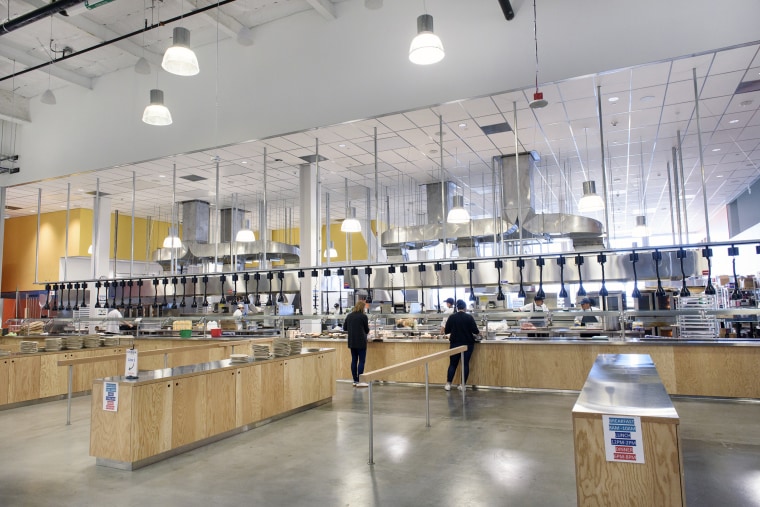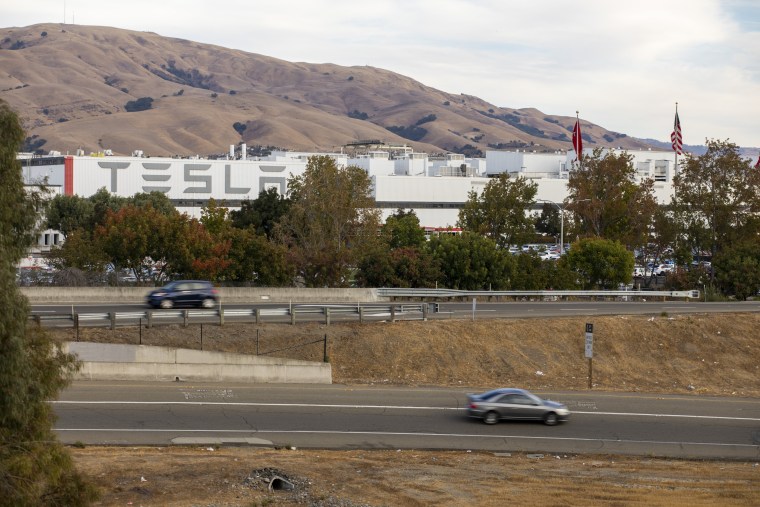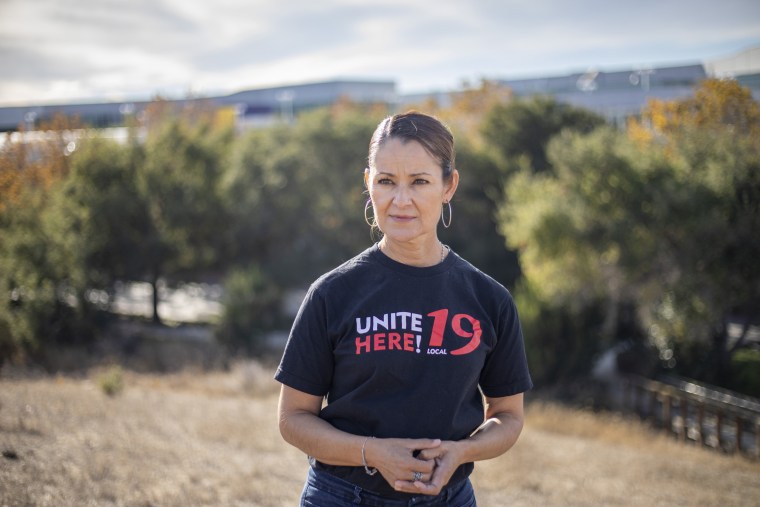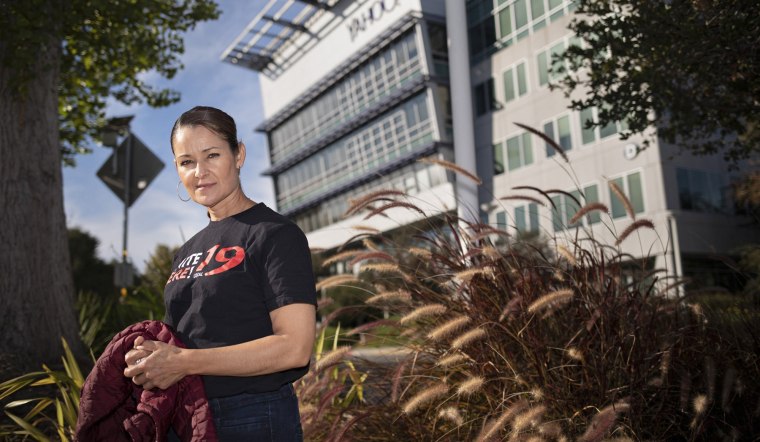Nora Morales, 57, an overnight janitor at Google's main campus in Mountain View, California, knows better than anyone else how empty Silicon Valley's offices have become. In recent months, while working her 8 p.m.-4 a.m. shift, she sees hardly anyone other than other overnight service workers. Pre-pandemic, there were always some Google employees working odd hours.
"It's a bit lonelier, a bit emptier," she said in Spanish.
The empty offices have created more anxiety for Morales as more tech companies delay any returns to the office at least through next summer. Even though her schedule allows little time for sleep, she depends on her $33,000 annual salary to support her family, who live in nearby San Jose. Her daylight hours are filled with cooking, household chores and helping her grandchildren with online schoolwork.
"The uncertain future of whether our work continues or not is a pretty frequent topic of conversation as we work," Morales said.
Morales echoes the uncertainty so many other blue-collar workers in Silicon Valley are feeling. Her story is but one of many in a new report released Thursday by Silicon Valley Rising, a labor activism umbrella group led by the labor organizing group Working Partnerships USA, based in San Jose.
The report found that while most major tech companies have kept their thousands of service workers for now, particularly those who are unionized, the future remains uncertain. Some companies, like Verizon, Genentech and LinkedIn, have halted contracts with their service contractors, which have, in turn, already laid people off.
According to the group's research, about 14,000 unionized workers across Silicon Valley serve as cafeteria staffers, janitors, security officers and bus drivers, among other positions. Such jobs are a "lifeline for communities of color," it found.
Nearly two-thirds are Black or Latino, and collectively they are estimated to earn $538 million annually, the report found. Typically, they do not work directly for tech giants but instead for one of a slew of third-party contracting companies. These workers do not have the option of working at home. They also realize that if they lose their jobs, there are far fewer jobs they can find, instead.
"There is an uncertainty for these workers — they don't know how long that will last," said Louise Auerhahn, the director of economic and workforce policy at Working Partnerships USA, a nonprofit advocacy organization.
Many large tech companies have continued to take in huge profits as the economy falters. Last month, Amazon, Apple, Alphabet and Facebook reported combined quarterly net profits of $38 billion. LinkedIn's parent company, Microsoft, made nearly $14 billion in profit during the third quarter of 2020.
But what is certain is that these workers have few alternatives if their jobs go away — especially work that carries benefits. A married couple featured in the report, Madeleine and Francisco Rivera, say their salaries — $26.72 and $22.60 per hour, respectively — have remained vital to their family, which supports their toddler-age son, August. Their employer, Compass Group, which provides food service to Google, pays their health insurance premiums.
The Riveras, who met while working as a barista and a dishwasher at Google's Mountain View campus, have been reassigned from their pre-pandemic positions in food service to work as receptionists in different buildings on the sprawling campus. They are grateful for any work.
"We wouldn't be able to go to the dentist or the doctor," Madeleine Rivera said. "Taking that away would be devastating."

Financial lifelines
Since the start of the pandemic, tech companies led the work-from-home movement.
In May, Facebook and Twitter said they would allow most white-collar employees to work from home indefinitely. Google and Amazon have committed to letting their workers stay home until next summer. But they have been less public about their commitments to the legions of often-forgotten people who cook, drive, clean for and protect the white-collar rank and file.

To be fair, most tech companies have tried to provide financial support for these workers. Twitter spokesperson Catherine Hill said in an emailed statement that the company has continued to pay the "majority" of its service contractors.
Google spokesperson Alex Krasov referred NBC News to a March blog post in which CEO Sundar Pichai said "hourly service vendor workers in our extended workforce who are affected by reduced work schedules are compensated for the time they would have worked."
Facebook spokeswoman Chloe Meyere said in an email that the company has continued to pay all contract workers whether or not they are able to work at home.
That has literally been a lifeline for workers like Liliana Morales, who is furloughed but continues to be paid for her cafeteria job at Facebook. Morales, the mother of three children, said she is spending much of her time helping with their schoolwork.
"If they continue to pay us, I will be able to pay my rent and buy food for my family," she said in Spanish. "Facebook is doing the right thing. God bless them, and especially this time, it's so unsure we don't know what to expect, and the most important thing is to have something so we can support our families."
Mixed experiences
There is an overwhelming sense of uncertainty over just how long these payments will last. Blue collar workers also don't always know why some jobs may remain and other jobs may disappear.
"There is a lot of nervousness out there," said Stacy Murphy, the vice president of Teamsters Local 853, a union that represents employee shuttle and bus drivers for major tech companies. "We try to stay optimistic and keep an open mind."
Take, for example, Genentech. It would seem at first glance that a biotechnology company that has been actively working on Covid-19 research would have kept all of its workers.
While it has kept its about 80 drivers on modified schedules, it was also one of the first of the big tech companies to cut several dozen janitorial jobs, as it seems to have decided to "mothball" some of its corporate offices as of August, said Stephen Boardman, a spokesman for SEIU United Service Workers West.
It would also make sense that Amazon would keep its drivers based on its growth through the pandemic. But in October, according to Teamsters Local 853, Amazon became the latest among five major tech companies to stop paying transit companies that employ drivers.
From March through September, companies including LinkedIn, Salesforce, Electronic Arts and Nvidia ended contracts with transportation providers, which resulted in driver layoffs. LinkedIn's decision meant 40 drivers lost their jobs.
Salesforce and Electronic Arts did not respond to requests for comment. Nvidia spokeswoman Lauren Finkle said by email that the company continues to "pay many of our service providers," but she did not provide further detail.
Kenly Walker, a LinkedIn spokesman, said that because LinkedIn does not employ shuttle drivers, it did not make staffing decisions. But Walker said "impacted employees" have taken advantage of LinkedIn's offer of "free Premium subscriptions" and professional coaching.
Quite a few tech companies have also kept their drivers and have even expanded during the pandemic.
Facebook, which is the largest employer of unionized drivers in Teamsters Local 853, has continued to pay its about 500 drivers, who work across four contracted transportation companies, said Tracy Kelley, an organizer with Local 853. Apple, Microsoft and Twitter drivers all remain on paid furloughs.
Tesla, according to Local 583, is continuing its worker shuttles to its Fremont manufacturing facility and expanding new routes into Antioch, northeast of Oakland, and Gilroy, south of San Jose.

For the most part, janitorial workers, maintenance and security guards have kept their jobs, Boardman said.
"The buildings don't get any smaller. They don't need any less maintenance," Boardman said. "Security has seen almost no layoffs."
Unemployment abyss
Since Erika Sanchez, a longtime cafeteria worker at the Verizon Media office in Sunnyvale, California, learned in September that she was one of 120 workers losing their jobs, she has distilled her worries into a single word: "desconcertada," or "unsettled."
Sanchez had worked in the cafeteria for 12 years, including during the era when it served as Yahoo's headquarters. At the end of her tenure, she was making $19 an hour working in the cafeteria, or about $38,000 a year.
She applied for unemployment insurance, which she said in Spanish she did not think would cover her expenses. She supports herself and her son, who is set to graduate next month from the University of California, Berkeley, and is temporarily living in Washington, D.C., while doing an internship.

By November, said Sanchez, 46, of San Jose, she has not yet received any unemployment benefits, nor has she found another permanent job. She has managed to pay her rent, and she has received food primarily through Hunger at Home, a local nonprofit, where she volunteers.
"I'm OK. I'm hanging in there, but economically I'm struggling and surviving," she said, saying she has been taking on odd jobs, including cleaning homes and selling jewelry and blankets with a relative.
When asked whether she sells her wares online, she said she did not know how, even though she worked in the technology industry.
"But it's something that I would like to learn how to do," she said.

